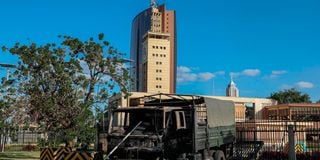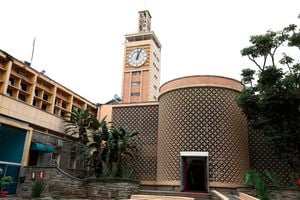
The shell of a police truck that was burnt by anti-Finance Bill demonstrators near Parliament buildings in Nairobi on Tuesday, June 25, 2024
The unprecedented invasion of precincts of Parliament and even gaining access to the revered chambers on Tuesday, June 25, is a pointer to lack of confidence in the institution and membership, according to analysts.
According to analysts, the literal occupation of parliament by the anti-Finance Bill 2024 protesters is a strong message to the MPs that the House can no longer protect them.
As the MPs were scampering for safety when their electorates came to pick the powers they donated to them, it was a stack reminder that indeed power belongs to the people and they can decide to exercise it directly or indirectly as enshrined in the constitution.
Considered a citadel of procedures and strict adherence to the Standing Orders, the chambers is one ‘hallowed’ place that no member, not even a sitting President can access on any other day.
But all these unwinding procedures were broken and the protesters who accessed the chambers addressed the Speaker directly without being given the microphone, so bold were they that they even threatened the speaker, something no member has ever done without meeting the unprecedented consequences.
President William Ruto on Tuesday night called the invasion of Parliament a treasonous act and an existential threat.
However, former speaker of the National Assembly Kenneth Marende said the invasion was a vote of no confidence not only on Parliament but the government.
Public participation
“If people had confidence in the Executive and Judiciary, then they would have said let Parliament just pass it, we will petition the President but in the event, he signs it then we will revert to Judiciary but they know the Judiciary will also let them down,” Mr Marende said.
He said had he been the one on the speakers' seat, he would have prevented the chaos in Parliament by blocking the consideration of the committee report since it was against the voices of the public captured during public participation.
“If I was in that Parliament, I would have handled it without it getting explosive. I would have simply told the committee that their report is inconsistent with the public constitution which is enshrined in the constitution. I would have sent the committee back to listen to the people,” Mr Marende said.
Speaker of the National Assembly Moses Wetang'ula on Wednesday termed the invasion of Parliament which he described as ‘hallowed’ grounds by the protesters as highly regrettable.
“The invasion of Parliament, the gory images of the wanton destruction of property and the desecration of the parliamentary square by people masquerading as youth and peace protesters who reigned terror on Parliament and forcefully made their way in these hallowed ground, is highly regrettable,” Mr Wetang’ula said.
Political analyst Martin Oloo said the invasion of parliament cannot be equated to treason, saying the 2010 constitution provides for picketing including occupying parliament.
“At any given time, people can go to Parliament and tell those MPs to go home if they are not serving their interests, it is not treason, they are simply taking back their power,” Mr Oloo said.
He pointed out that the deployment of the military to the streets will be counterproductive. “If we think the military is the best to supervise the public, then why are we sending police to Haiti? Be posed.
Moi University lecturer Masibo Lumala is a clear demonstration of a vote of no confidence as the people express their displeasure with their representatives.
According to Prof Lumala, the invasion of Parliament is a clear indication that the institution is no longer revered and held in high regard as it used to be.
“It is an expression of displeasure and the people are taking back their power. It is also a strong message to the MPs that even the police cannot protect them. They can only get protection from the people,” Prof Lumala said.
Rarieda MP Otiende Amollo expressed concern over how the National Assembly conducted itself while approving the deployment of Kenya Defence Forces (KDF) within 30 minutes with no proper debate over the matter, a move that further raises questions on the August House.
“And without the media, without most members, without proper debate, in a record 30 minutes, the National Assembly has just made Kenya a military State. Authorizing deployment of KDF without indicating where, why or for what period and did so retrospectively contrary to Article 241 (3) (c) of the constitution."

A section of the Members' Dining Hall in the Parliament buildings that was vandalised on Tuesday, June 25, 2024.
Nominated MP John Mbadi said members of the public invading Parliament is a vote of no confidence and message that MPs are not using the delegated power correctly.
“Occupying Parliament simply means, the people are taking back the delegated authority they gave to MPs because they feel they are not using it well,” Mr Mbadi said.
Early before the afternoon turn of events, Speaker Wetang’ula had assured MPs of their security within the precincts of Parliament and even tasked the Majority Leader Kimani Ichung’wah to reach out to the Inspector of Police Japhet Koome on the same.
He even dismissed reports that the House mace was carted away by demonstrators on Tuesday, saying it was untrue as what was taken is a dummy mace on display. The mace is the symbol of authority of the August House.
His commitment however did not live as he also sought safety through the Bunge tunnel to the new Bunge Towers.







